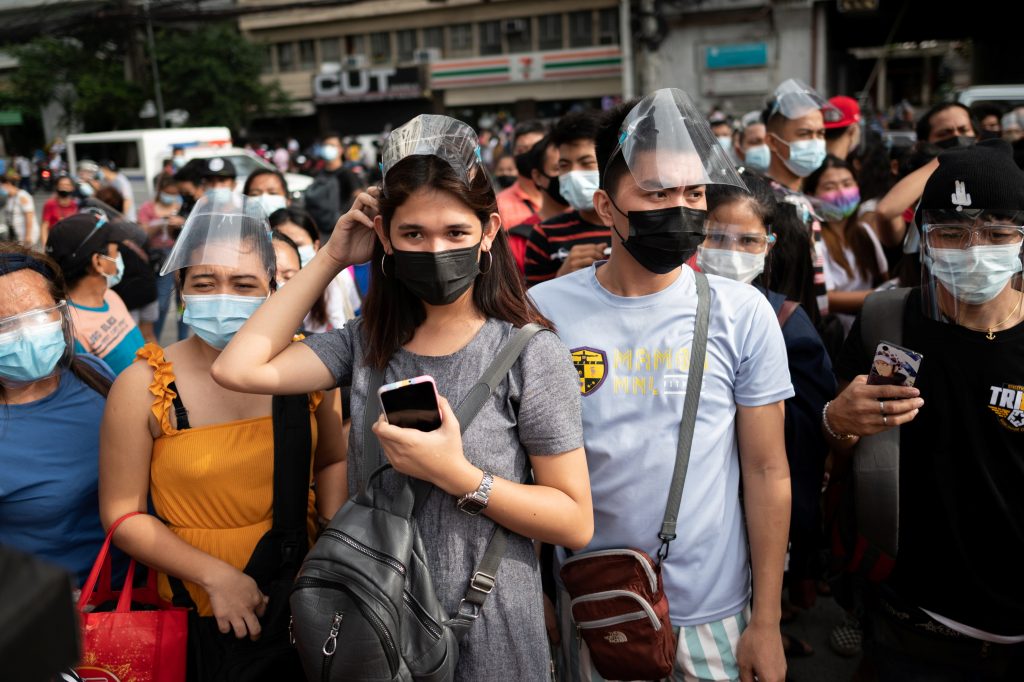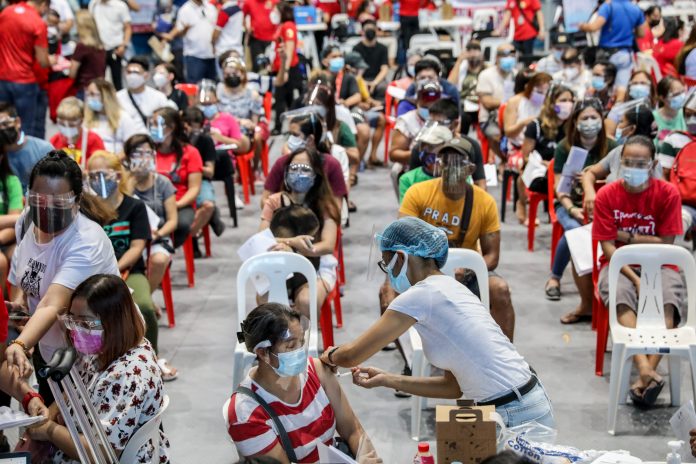The Philippines reported a record in new coronavirus cases on Friday and warned the trend could continue as restrictions were relaxed in the capital region to try to spur economic activity.
The health department confirmed 17,231 new cases and 317 fatalities, the highest daily death toll in four months. Deaths reached more 1.8% of total cases, bringing the August average to 1.5%, versus 1.9% in July.
With more than 1.8 million cases and 31,198 deaths, the Philippines has one of the highest coronavirus tolls in Asia.
The health department urged more people to identify infections sooner and get vaccinated to boost protection.
“Early consultation and testing would help to cut infections in homes, communities, and workplaces,” it said in a statement.
More than 26% of samples taken tested positive, the country’s highest positivity rate so far, while active cases hit 123,251, a four-month record.
Hospitals were filling up, with 73% of the country’s intensive care capacity already utilized and 61% of isolation beds occupied, government data showed.
President Rodrigo Duterte on Thursday approved the relaxation of coronavirus curbs in the capital region, a metropolis of 16 cities and home to more than 13 million people, to allow more businesses to resume operations.
An ecumenical group of students, meanwhile, lambasted Duterte and Health Secretary Francisco Duque “for their record-breaking failed pandemic response.
The Student Christian Movement of the Philippines cited reports of alleged “mismanagement” of funds intended for the health sector as flagged by the Commission on Audit.
“Record-high levels of new COVID-19 cases on the last day of this new round of ECQ underscores the dismal failure of Secretary Duque and President Duterte,” said the student’s group in a statement.
“ECQ” refers to the strict “enhanced community quarantine” imposed by the government in the past two weeks.
The group said “record-breaking failures” on health, economy, and human rights have made the Filipino people “worried and expect for worse situations.”

Asia extends lockdowns
In other parts of Asia, more countries announced drastic curbs and longer lockdowns for citizens as authorities struggle to rein in outbreaks of the highly infectious Delta variant of the coronavirus.
In Australia’s biggest city of Sydney, 2 million residents, or roughly 40% of its population, face curfew from 9 p.m. to 5 a.m. next week, along with limits on exercise.
A lockdown of the entire city, now in its eighth week, was also extended until the end of September, with residents told to wear masks outdoors, except for exercise.
In neighboring New Zealand, an outbreak that began this week widened to the capital, Wellington, from the biggest city of Auckland, prompting Prime Minister Jacinda Ardern to extend a nationwide lockdown until Tuesday.
Vietnam imposed its toughest order yet, barring residents of the business hub of Ho Chi Minh City from leaving their homes from Monday, although further details have yet to be announced.
“Each home, company, factory should be an anti-virus fort,” said Pham Duc Hai, deputy head of the coronavirus authority in Vietnam’s biggest city, adding that people were being asked not to go outdoors.
Like Australia and New Zealand, Vietnam was once lauded for success in containing the virus, but is finding earlier measures were insufficient.
It has more than 312,000 infections and 7,150 deaths, up from a May 1 figure of less than 3,000 cases and 35 deaths.
Japan plans to roughly triple daily COVID-19 tests to 320,000, an acknowledgement that its main containment strategy of breaking up clusters of infections was no longer working in big cities like Tokyo, the capital.
The move comes after new daily cases exceeded 25,000 on Thursday for the first time.
South Korea extended for two weeks social distancing curbs that include a ban on gatherings of more than two people after 6 p.m.
Thailand, which had also managed to hold down infection numbers until the Delta variant hit, said its cases had passed the 1-million mark on Friday. – with reports from Reuters









